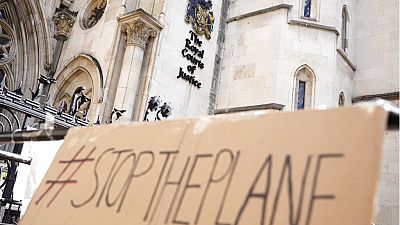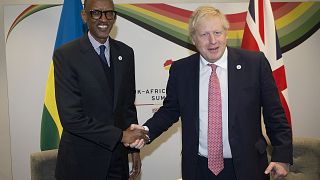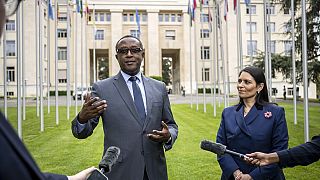United Kingdom
The British government vowed Wednesday to organize more flights to deport asylum-seekers to Rwanda after a last-minute court judgment grounded the first plane due to take off under the controversial deal.
Home Secretary Priti Patel said "preparation for the next flight begins now" despite legal rulings that none of the migrants earmarked for deportation could be sent to the East African country.
Under a deal signed in April between Britain and Rwanda, the U.K. government plans to send some migrants who arrive in the U.K. as stowaways or in small boats to Rwanda, where their asylum claims will be processed. If successful, they will stay in the African country, rather than return to Britain.
Prime Minister Boris Johnson's government says the plan is a legitimate way to protect lives and thwart the criminal gangs that send migrants on risky journeys across the English Channel.
Human rights groups argue that the plan rides roughshod over the protections afforded to refugees under rules set up after World War II.
They have called the idea unworkable, inhumane and a waste of money — Britain paid Rwanda 120 million pounds ($150 million) upfront for the deal.
U.K. courts refused last week to ground the first flight, scheduled for Tuesday, but the number due to be aboard was whittled down by appeals and legal challenges. The European Court of Human Rights— an international tribunal supported by 46 countries including the U.K. — ruled late Tuesday that an Iraqi man due to be on the plane shouldn't fly, saying he faced "a real risk of irreversible harm." That allowed the final few migrants on the plane to win a reprieve.
U.K. Cabinet minister Therese Coffey said the government was "surprised and disappointed" by the ruling.
"I think the public will be surprised at European judges overruling British judges," she told Sky News.
Some lawmakers from the governing Conservative Party say Britain should withdraw from the Strasbourg-based European human rights court, which the U.K. helped to set up.
The European court's judgment on Tuesday didn't overrule British decisions, which declined to ground the flight as a whole. The ECHR dealt with the cases of an individual being aboard.
A full trial of the legality of the U.K. government plan is due to be heard in the British courts by the end of July.
Human rights lawyer Frances Swaine, who represents one of the people due to be sent to Rwanda, urged the government to wait for that decision before organizing any more deportation flights.
More than 28,000 migrants entered the U.K. across the Channel last year, up from 8,500 in 2020, and about 10,000 have arrived so far this year. Dozens have died, including 27 people in November when a single boat capsized.














01:16
Africa mourns Pope Francis, a voice for peace and justice
01:14
ECOWAS Meets in Ghana to Tackle Member Withdrawals
Go to video
Uganda plans law to allow military prosecution of civilians
Go to video
EU foreign ministers discuss Ukraine, Syria and EU-African relations in Luxembourg.
01:58
Latin American leaders urge unity amid U.S. trade and migration tensions
Go to video
Paris hosts the 4th edition of African Cinema Days featuring Côte d'Ivoire